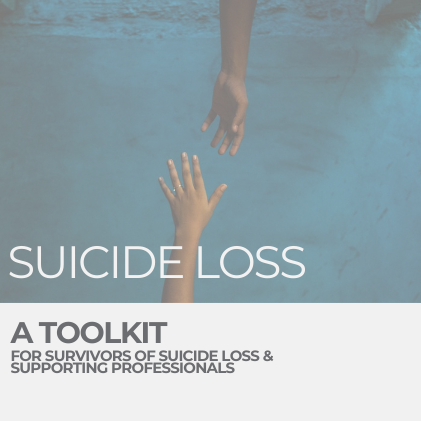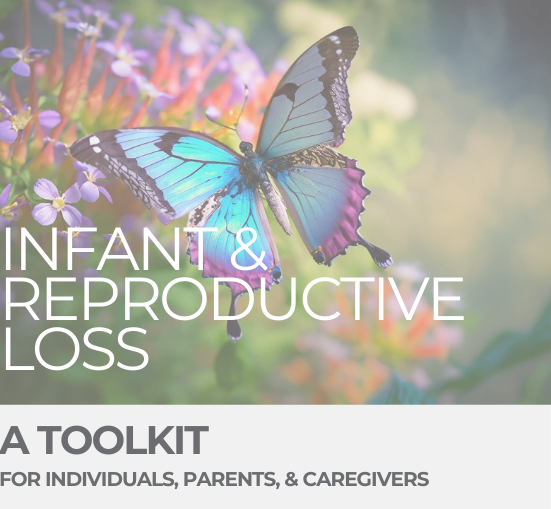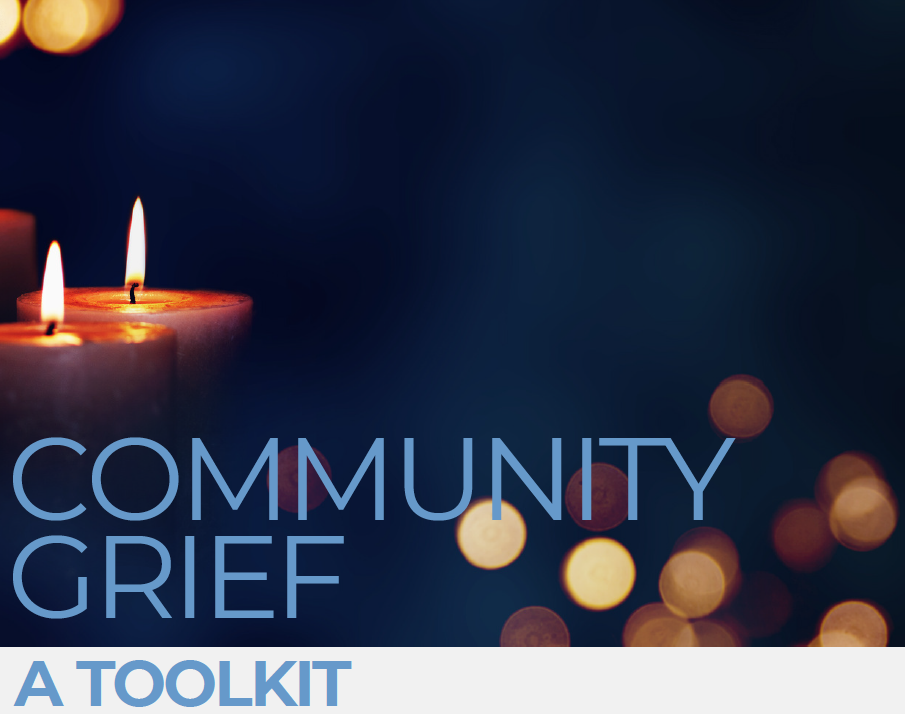Posts Tagged ‘toolkit’
Children’s Grief and Loss Toolkit (ages 6-12) [FREE Downloadable PDF]
Grief is a natural experience, and is considered one of the most stressful life events a person can experience. 1 in 14 children under the age of 18 will experience the death of someone close to them. Every year, approximately 200 000 children are grieving the death of someone in their extended family or community. Grief doesn’t stay at home: it follows children throughout their life, and into the classroom with 1 grieving child in every other classroom in Canada. When grief impacts a community, support for grievers of all ages is important. Children’s grief is often misunderstood due to myths about grief. Our children’s grief and loss toolkit pulls together our original multi-media resources about grief into an easy-to-access format which provide helpful information about the grief experience, stories of childhood experiences of loss, and helpful strategies to move through grief. This toolkit has been curated by mental health professionals for other helpers, for individuals, and their networks as they navigate grief and loss together. They are free to download and use.
You can download the toolkit here.
What is a Toolkit?
Grief Stories strives to create a free, accessible, diverse, inclusive, on-demand resource, reducing barriers to accurate online information about grief, helping grievers and those who support them using innovative technology. Our toolkits curate our multimedia content into an easy-to-navigate format on different topics, all vetted by healthcare professionals with expertise in grief and loss.
Toolkits are a popular knowledge translation strategy for disseminating health and wellness information, to build awareness, inform, and change public and healthcare provider behaviour. By keeping our content and toolkits free to access, we help individuals feel confident in connecting with and supporting grievers in their life, while at the same time providing accurate information about grief to help grievers make sense of their experience, one story at a time so they feel less alone.
As a virtual organization, we envision a world connected and supported in grief through our free multimedia library of content. Grief Stories relies on donations to cover many operational costs, including content creation. Each donation we receive allows us to share even more stories, helping grief make sense. If you, or someone in your life has found one of the toolkits helpful, please consider making a suggested donation of $10.00.
For less than the price of a premium streaming service, you can help us share our stories even further with those who need them most – helping grief make sense, one story at a time.
Suicide Loss Toolkit [Free Downloadable PDF]
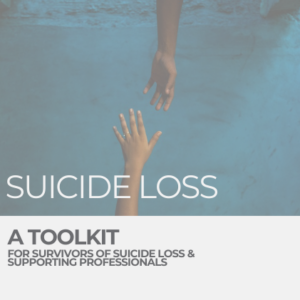
Approximately 4500 people in Canada die by suicide each year. That is approximately 12 people who die by suicide each day. In 2022, 49,476 Americans died by suicide. That’s 1 death every 11 minutes. On average, 5 people grieve for every death. That leaves over 250,000 people experiencing suicide-related grief and distress. Grief Stories has seen these impacts firsthand: suicide loss has been the most viewed topic on our Youtube channel all year. At Grief Stories, we passionately believe sharing stories and insights fosters connection, helping people cope with grief. Grief Stories is proud to announce the release of our latest toolkit titled: the Suicide Loss Toolkit.
Our suicide loss toolkit pulls together our original multi-media resources about grief into an easy-to-access format which provides helpful information about the grief experience, stories of suicide loss from survivors, and helpful strategies to move through grief. This toolkit has been curated by mental health professionals for other helpers, for individuals, and their networks as they navigate grief and loss together. They are free to download and use.
You can download the toolkit here.
What is a Toolkit?
Grief Stories strives to create a free, accessible, diverse, inclusive, on-demand resource, reducing barriers to accurate online information about grief, helping grievers and those who support them using innovative technology. Our toolkits curate our multimedia content into an easy-to-navigate format on different topics, all vetted by healthcare professionals with expertise in grief and loss.
Toolkits are a popular knowledge translation strategy for disseminating health and wellness information, to build awareness, inform, and change public and healthcare provider behaviour. By keeping our content and toolkits free to access, we help individuals feel confident in connecting with and supporting grievers in their life, while at the same time providing accurate information about grief to help grievers make sense of their experience, one story at a time so they feel less alone.
As a virtual organization, we envision a world connected and supported in grief through our free multimedia library of content. Grief Stories relies on donations to cover many operational costs, including content creation. Each donation we receive allows us to share even more stories, helping grief make sense. If you, or someone in your life has found one of the toolkits helpful, please consider making a suggested donation of $10.00.
For less than the price of a premium streaming service, you can help us share our stories even further with those who need them most – helping grief make sense, one story at a time.
Infant & Reproductive Loss Toolkit [Free Downloadable PDFs for Individuals and Professionals]
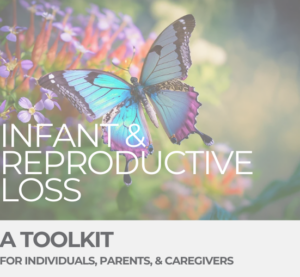
Navigating life, death, and loss can be overwhelming. Mental health professionals designed this toolkit for individuals, parents, caregivers, and families navigating perinatal and reproductive loss.
Reactions to pregnancy and reproductive loss are as unique as fingerprints. Some can process the experience relatively quickly, while others experience unrelenting pain and grief.
We hope that this toolkit can be used to add tools to your toolbox and offer words of support, guidance, and care as you navigate life after loss.
Download the Infant and Reproductive Loss Toolkit for Individuals HERE.
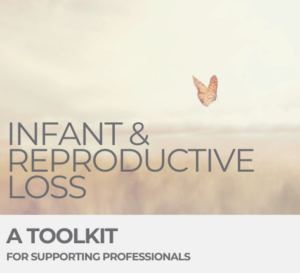
Navigating life, death, and loss can be overwhelming. This toolkit was designed by mental health professionals for other professionals who support individuals during their reproductive years and beyond.
It contains information about grief and navigating the impact of loss alongside your clients.High-quality grief care includes compassionate and open communication, informed choice and individualized care. Compassionate communication, the most important element, is required in all aspects of care throughout and following loss.
Download the Infant and Reproductive Loss Toolkit for Supporting Professionals HERE.
What is a Toolkit?
Grief Stories strives to create a free, accessible, diverse, inclusive, on-demand resource, reducing barriers to accurate online information about grief, helping grievers and those who support them using innovative technology. Our toolkits curate our multimedia content into an easy-to-navigate format on different topics, all vetted by healthcare professionals with expertise in grief and loss.
Toolkits are a popular knowledge translation strategy for disseminating health and wellness information, to build awareness, inform, and change public and healthcare provider behaviour. By keeping our content and toolkits free to access, we help individuals feel confident in connecting with and supporting grievers in their life, while at the same time providing accurate information about grief to help grievers make sense of their experience, one story at a time so they feel less alone.
As a virtual organization, we envision a world connected and supported in grief through our free multimedia library of content. Grief Stories relies on donations to cover many operational costs, including content creation. Each donation we receive allows us to share even more stories, helping grief make sense. If you, or someone in your life has found one of the toolkits helpful, please consider making a suggested donation of $10.00.
For less than the price of a premium streaming service, you can help us share our stories even further with those who need them most – helping grief make sense, one story at a time.
Community Grief Toolkit [Downloadable!]
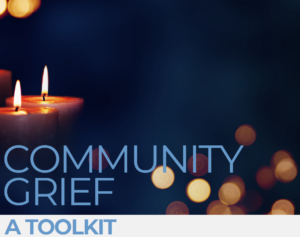
Navigating life, death, and loss can be overwhelming. This toolkit is designed by mental health professionals and contains information about grief, different types of grief we may experience, gentle reminders on how to move through grief, as well as tips for those who may be supporting someone in their life who is grieving.
This toolkit also reflects on how we support grief in the community. The tools to come together and honour our collective experiences and how to build the resources for further support.
Download it here.
What is a Toolkit?
Grief Stories strives to create a free, accessible, diverse, inclusive, on-demand resource, reducing barriers to accurate online information about grief, helping grievers and those who support them using innovative technology. Our toolkits curate our multimedia content into an easy-to-navigate format on different topics, all vetted by healthcare professionals with expertise in grief and loss.
Toolkits are a popular knowledge translation strategy for disseminating health and wellness information, to build awareness, inform, and change public and healthcare provider behaviour. By keeping our content and toolkits free to access, we help individuals feel confident in connecting with and supporting grievers in their life, while at the same time providing accurate information about grief to help grievers make sense of their experience, one story at a time so they feel less alone.
As a virtual organization, we envision a world connected and supported in grief through our free multimedia library of content. Grief Stories relies on donations to cover many operational costs, including content creation. Each donation we receive allows us to share even more stories, helping grief make sense. If you, or someone in your life has found one of the toolkits helpful, please consider making a suggested donation of $10.00.
For less than the price of a premium streaming service, you can help us share our stories even further with those who need them most – helping grief make sense, one story at a time.


